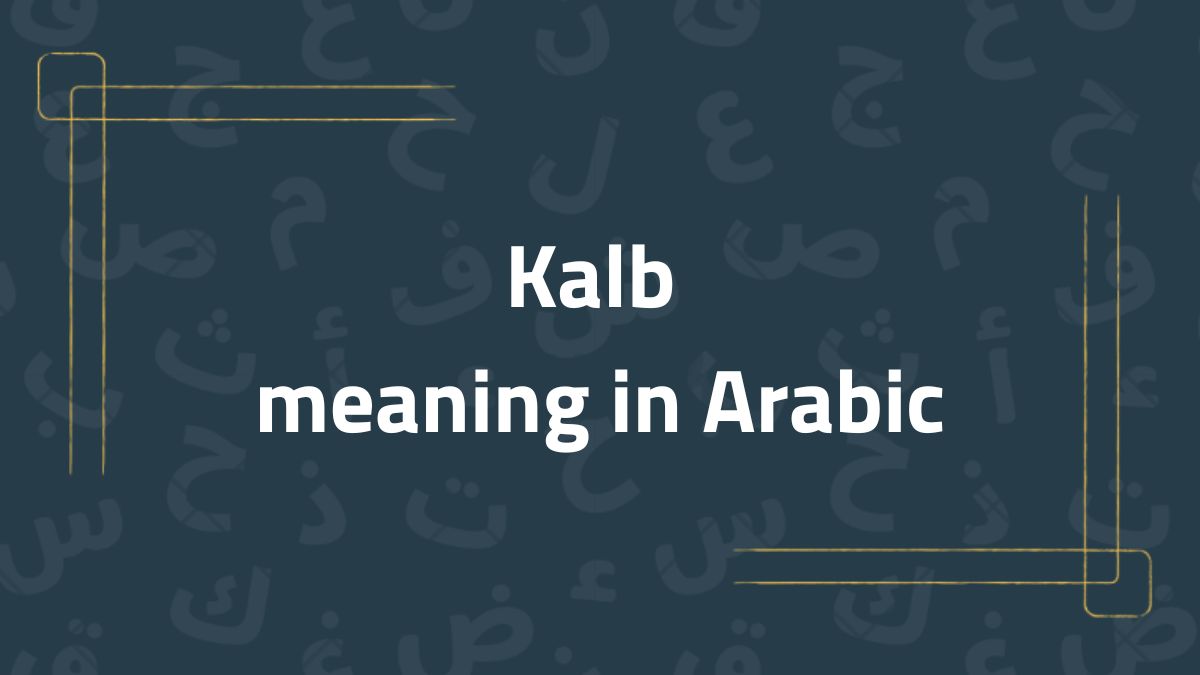The Word Kalb Meaning in Arabic With Examples

The Arabic word “kalb” (كَلْب) is a common term with a straightforward meaning. It is important for learners to understand its definition, usage, and cultural significance. This article explains the meaning of “kalb” in Arabic, its linguistic roots, examples in sentences, and its role in the Quran.
The Meaning of “Kalb” in Arabic
The word “kalb” translates to “dog” in English. It refers to the domesticated animal known for loyalty and companionship. The pronunciation is “kalb,” with a strong “k” sound and a short “a” vowel.
Linguistic Root and Grammatical Usage
“Kalb” comes from the Arabic root letters “k-l-b” (ك-ل-ب), which relate to dogs. The word is a noun and can change form based on grammatical rules:
-
Singular: كَلْب (kalb) – “a dog”
-
Dual: كَلْبَان (kalbān) – “two dogs”
-
Plural: كِلَاب (kilāb) – “dogs”
The word can also appear in possessive forms, such as “kalbī” (كَلْبِي) meaning “my dog.”
Examples of “Kalb” in Arabic Sentences
-
Arabic: الْكَلْبُ يَنْبَحُ فِي اللَّيْلِ.
English: The dog barks at night. -
Arabic: لَدَيْهِ كَلْبٌ كَبِيرٌ وَأَلِيفٌ.
English: He has a big and friendly dog. -
Arabic: الْكِلَابُ مُفِيدَةٌ فِي حَرَاسَةِ الْبَيْتِ.
English: Dogs are useful for guarding the house.
Cultural or Quranic Significance of “Kalb”
The word “kalb” appears in the Quran, often in stories or as a metaphor. One notable mention is in Surah Al-Kahf (18:18), where a dog accompanies the People of the Cave (Ashab al-Kahf). The dog is described as loyal, showing a positive side of dogs in Islamic tradition.
In Arab culture, dogs are respected for their guarding abilities but are often seen as unclean in certain religious contexts. This influences how the word is used in daily life.
Common Misunderstandings or Mistakes
Some learners confuse “kalb” with similar-sounding words like “qalb” (قَلْب), which means “heart.” The pronunciation difference is key: “kalb” has a “k” sound, while “qalb” has a deeper “q” sound from the throat.
Another mistake is assuming “kalb” is always negative. While dogs are not kept as pets in some Muslim households, the word itself is neutral and depends on context.
Why You Should Learn “Kalb”
Understanding “kalb” helps in daily conversations, especially when discussing animals or reading Islamic texts. It is a basic vocabulary word for Arabic learners and appears in religious stories. Knowing its meaning and usage improves comprehension and communication.
Conclusion
The Arabic word “kalb” means “dog” and is used in both everyday language and the Quran. It has a simple grammatical structure but requires attention to pronunciation to avoid confusion with similar words. Learning “kalb” enhances Arabic vocabulary and helps in understanding cultural and religious references. Whether for study or conversation, this word is essential for learners.
Discover the Quran and Arabic with Shaykhi Academy
We highly recommend Shaykhi Academy for anyone seeking to learn the Quran and Arabic with excellence. The academy is known for combining expert teaching with a compassionate approach, making it a top choice for students worldwide who want to connect deeply with the words of Allah.
At Shaykhi Academy, you’ll find highly qualified teachers who specialize in guiding learners of all ages and levels. Whether you’re just beginning your journey with Arabic letters or aiming to master Tajweed and Quran recitation, their personalized lessons ensure steady progress at your own pace.
With engaging classes, flexible scheduling, and a focus on both spiritual and linguistic growth, Shaykhi Academy makes learning both enjoyable and impactful.
Watch a sample class below to see Shaykhi Academy in action:
Learn Arabic, Quran, And Tajweed With Free Trial!
Make your home a place of faith, understanding, and connection with the Quran. Whether you're starting from scratch or deepening your knowledge, Shaykhi Academy is here to guide you — step by step. ✅ Tailored for all ages ✅ Clear, structured learning ✅ Flexible online sessions ✅ Book your free trial session now!
Learn More
